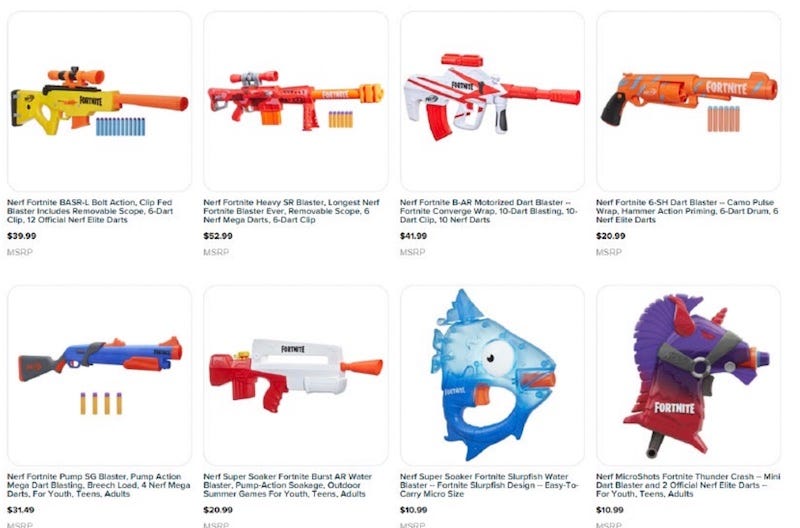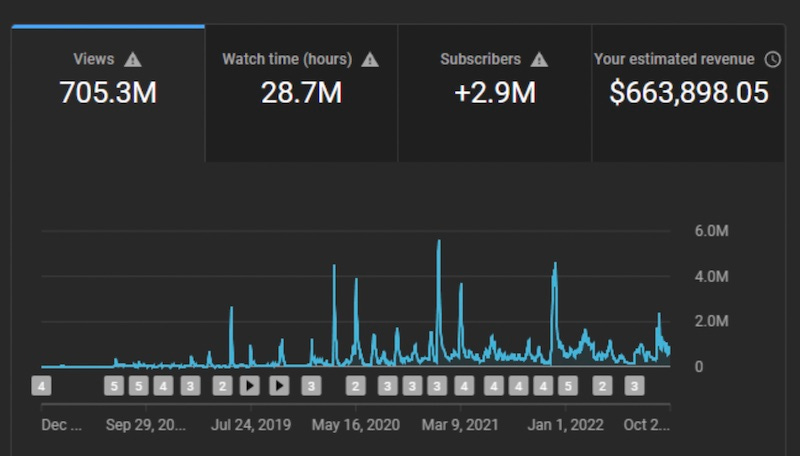Deep dive: Steam's top-grossing releases of 2022
Also: more on that 'Fortnite vs. kids' FTC fine, and lots more news...
[The GameDiscoverCo game discovery newsletter is written by ‘how people find your game’ expert & company founder Simon Carless, and is a regular look at how people discover and buy video games in the 2020s.]
Second newsletter of 2023, assemble! This time, we’re leading things off with a look at the top-grossing games of last year on Steam. (And kudos to Steam for actually revealing this useful info - something not done by console platforms in the same way.)
Oh: and for those not subbed to GameDiscoverCo Plus, our big 2023 ‘comeback’ Plus newsletter arrives Friday. We’ll be recapping the major Steam surprises of December, including a F2P breakout featuring ‘Huggy Wuggy’. Who dat? Sign up and find out…
Steam’s top-grossing games of 2022, analyzed…
As part of its end-of-year festivities, Valve produced its regular ‘Best Of 2022’ sales page, which includes the top-grossing titles of the year - alongside other interesting tabs like top games by CCU, top new releases, top-grossing VR titles & most played games on Steam Deck.
As we did last year, myself and Alejandro have made a handy Google Drive document (exportable to Excel at your leisure!) which looks at the top-grossing games, compares them by tiers back to 2019, & adds release date, base price, and IAP/DLC info.
One important thing to note here, as Steam notes: “Games are randomly sorted within each bucket: Platinum: 1st - 12th; Gold: 13th - 24th; Silver: 25th - 50th; Bronze: 51st - 100th.” In other words, you’ll see games randomly sorted in each tier, and the top game in Platinum on our list likely isn’t the top-grossing game of the year. But it’s still helpful!
So what do we see on this year’s Steam trends? We’d like to point out the following:
There’s decent number of new games in the Platinum tier: 6 out of the 12 Platinum games are new to Steam in 2022. There’s 3 ‘expensive’ new single-player premium titles (Elden Ring, Dying Light 2, Monster Hunter Rise), and a couple of GaaS titles (Lost Ark & Yu-Gi-Oh! Master Duel!, the low-profile $ hit of the year), plus Call Of Duty’s Steam return.
Legacy ‘games as a service’ titles quietly take up a big chunk of the chart: no big surprise here, but there’s a bunch of games - like Destiny 2, PUBG, Dead By Daylight, Warframe, GTA V and even War Thunder - that just keep cranking out the numbers year after year, due to dedicated players and continued monetization.
Multi-year trends can show you which titles are stepping up or fading out: there’s a few interesting example of this, such as F2P ARPG Path Of Exile gradually going from Gold in 2019 to Bronze in 2022. On the other hand, Cyberpunk 2077 went from Platinum to Silver back up to Gold, showing that the ‘we fixed stuff now, try us!’ campaign - alongside discounting - went well.
No DLC and no IAP is an increasingly rare place to be: of these top titles, we count less than 20% that don’t have any paid add-ons of any kind. Many of those are breakout titles from smaller dev teams that aren’t beholden to corporate masters, and likely don’t need the extra money (No Man’s Sky, Raft, Project Zomboid, Phasmophobia).
When I see these type of lists, I also look for specific games on them that exemplify a particular facet of Steam success. Here would be my picks for 2022:
‘DLC longevity and bundling’ - American Truck Simulator: SCS Software’s truck sim has been around since 2016, but has been Bronze ranked for 3 out of the 4 last years, thanks to $95 - in Winter Sale currency - worth of DLC, including the latest Texas expansion.
Niche audience, but great monetization’ - World Of Warships: well, with 6-10k CCU, Wargaming’s follow-up to World Of Tanks isn’t super niche. But it does have a very dedicated player base and a lot of buyable ships, upgrades, and other ways to keep spending. For better or worse, that’s what gets you a Bronze ranking.
‘Traditional box office smash premium model’ - God Of War: putting out a really gorgeous $60 game can still work - and be very profitable. And Sony’s top titles like God Of War - which moved from PlayStation to PC in 2022 and ranked Gold - is a great example.
Is any of this a surprise to you? And if it is, why? We should all be open-minded about our preconceptions of what actually does well in today’s market. And it’s rare that you get such clear data on a major PC/console discovery platform. So… hurray.
Fortnite’s FTC fine: what Epic knew about kids playing…
We already did a newsletter late last year about Epic’s record $275 million penalty from the U.S. Federal Trade Commission around violations of the Children’s Online Privacy Protection Act. So nuff said, right?
Well, we didn’t have a chance to check the full FTC complaint [36 page .PDF link]. And it’s worth revisiting, since now we have, Epic looks far more unreasonable. Though we’re aware that the FTC likely picked the most egregious examples…
So, food for thought: if the FTC subpoenas you, and audits your internal comms, they will probably find things like… this:
Epic was internally aware that pre-teen players played Fortnite a lot: employees commented on internal emails: “We want to be living room safe, but barely” and “all theming should be relevant to a 8-14 y.o”, and Epic’s merch agent put together deals which included: “Fortnite-branded… ‘back to school’ merchandise.” And the company saw surveys saying that 53% of U.S. children aged 10-12 played Fortnite weekly (!).
Attempts to ignore age restrictions verged on the ridiculous: in 2018, Microsoft personnel told Epic that it “would have to block Xbox accounts belonging to children under 13 from participating in cross-console gameplay through Fortnite.” Which Epic helped implement, but didn’t take any other steps at the time to be compliant with COPPA.
Internal attempts to remove voice chat as default from Fortnite were stymied: , Epic’s then UX director “emailed Epic leadership in August 2017 seeking ‘basic toxicity prevention’ mechanisms - noting that ‘surely a lot of kids’ were currently playing the game, and imploring Epic to ‘avoid voice chat or have it opt-in at the very least.’” But voice chat was still turned on as default a couple of months later, and later UX team attempts to add better privacy options weren’t prioritized.
The FTC is very clear about what the negative effect is here - specifically: “Epic has caused substantial harm by matching children and teens with strangers in interactive gameplay while publicly broadcasting players’ display names and imposing real-time communications through on-by-default voice and text chat.”
So, I get the ‘better late than never’ response from Epic - and late 2019 was when the most egregious COPPA issues were fixed, with “high privacy default settings for players under the age of 18.” But there’s definitely an argument that Epic wanted to ignore the law to boost their overall growth. Hence the $275 million fine.
[Side note: some interesting numbers on Fortnite merch in the complaint - by 2020 H1, “more than $1 billion in gross sales of Fortnite-branded merchandise” sold, with “more than $130 million in gross royalties to Epic and its licensing agent.” Toys were nearly 70% of that total.]
The game discovery news round-up..
And we’re almost done for this fine newsletter. So let’s take a gander through some of the new discovery and platform news that we discovered (ha ha!) since Monday:
The player-voted winners for the 2022 Steam Awards got announced, with Elden Ring flouncing off with Game Of The Year, as well as Best Game You Suck At, Raft winning Better With Friends, and Stray picking up Most Innovative Gameplay, among others.
Global geopolitics vs. social media news: U.S. FCC commissioner Brendan Carr says “that India set an ‘incredibly important precedent’ by banning TikTok two and a half years ago”, and banning is the “natural next step in our efforts to secure [our] communication network.” He’s one of five FCC commissioners, but always notable to see anti-China rhetoric close to U.S. decision-making.
Japanese retail game sales for 2022? Are they still relevant? Relevant enough for this paragraph: detailed here, via Famitsu, it looks like Switch has 9 of the top 10 titles, headed by two Pokemons and Splatoon 3 (the only >1 million sellers), with Elden Ring on PS4 (343,000 units) the sole non-Switch holdout.
Over at GamesIndustry, they have some analysts make predictions for 2023. For example, from Serkan Toto: “In 2023, the gaming industry should continue to see relatively little effect on growth from a possible recession.” And Piers Harding-Rolls: “Will the Microsoft-ABK deal go ahead? Yes, but with further concessions.”
How did VR hardware sales do in 2022? Not spectacularly, we guess: “Sales of VR headsets in the U.S. this year declined 2% from a year earlier to $1.1 billion as of early December, according to data shared with CNBC by research firm NPD Group.”
An interesting ‘big picture’ framing of the rise of the game biz from Stephen Totilo at Axios: “Streaming services, Hollywood studios, tech giants - even the Saudi government - are racing to capitalize on gaming's vast and ever-expanding popularity, and its lucrative intellectual property.” I feel like he has a point…
The inevitable Microsoft x Activision update: there was a preliminary hearing in the FTC’s attempts to block the deal, and Microsoft is "preparing for all options”. Oh, and Chile is perfectly fine with the MS x ATVI deal, which must at least be a small ‘cuddly toy’ consolation prize for Microsoft?
MobileDevMemo’s predictions for 2023 in the mobile space are on-point. Particularly notable: “Google recently began enforcing restrictions [on interruptive interstitial ads] and I believe that the hypercasual category, which was already facing substantial friction on iOS as a result of ATT, will cease to exist in its current state as a result.”
Just YouTube things: some new content policies mean especially violent titles like The Callisto Protocol may get demonetized easier; not games, but interesting context - a Lego channel has been 100% transparent with its YouTube earnings, showing 705 million views and $664,000 in revenue (above).
Microlinks: Nvidia’s GeForce Now cloud gaming is upgrading its premium $20/month plan “by adding new servers with better hardware components”; Apple Arcade has an interesting line-up for January, including Game Freak’s Pocket Card Jockey; a few games - including Resident Evil Village - are doing free PSVR2 upgrades for their PSVR versions at launch.
Finally, made specifically for Battlefield and Mirror’s Edge creator DICE’s 30th anniversary, we loved this specially commissioned chronological mash-up of DICE’s entire game catalog from audiovisual mashup pioneer DJ Food:
[We’re GameDiscoverCo, an agency based around one simple issue: how do players find, buy and enjoy your premium PC or console game? We run the newsletter you’re reading, and provide consulting services for publishers, funds, and other smart game industry folks.]



